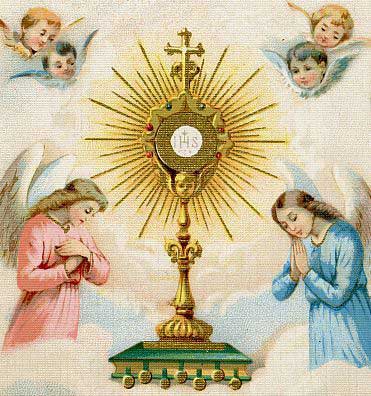Gaura Priya
IRL
"You gave Your people Food of Angels,
and without their toil
You supplied them from heaven
with Bread ready to eat,
providing every pleasure
and suited to every taste.
For Your sustenance manifested
Your sweetness towards your children;
and the Bread, ministering to the desire
of the one who took it,
was changed to suit everyone’s liking.
Therefore at that time also,
changed into all forms,
it served Your all-nourishing bounty,
according to the desire
of those who had need,
so that Your children,
whom You loved, O Lord,
might learn that it is not
the production of crops that feeds humankind
but that Your Word sustains those who trust in You."
-- Wisdom 16:20-21,25-26 (NRSV)

and without their toil
You supplied them from heaven
with Bread ready to eat,
providing every pleasure
and suited to every taste.
For Your sustenance manifested
Your sweetness towards your children;
and the Bread, ministering to the desire
of the one who took it,
was changed to suit everyone’s liking.
Therefore at that time also,
changed into all forms,
it served Your all-nourishing bounty,
according to the desire
of those who had need,
so that Your children,
whom You loved, O Lord,
might learn that it is not
the production of crops that feeds humankind
but that Your Word sustains those who trust in You."
-- Wisdom 16:20-21,25-26 (NRSV)

So why do you love the Blessed Sacrament?
For me, the Eucharist is the crux of the Divine Liturgy, the centre of my faith, where Christ, the Word of God Incarnate, places Himself in communion with us through the Sacrament of Bread and Wine. When the Eucharistic prayers are recited, I feel as if I stand in the midst of eternity, in a spatial glimpse of the timelessness of Christ's eternal sacrifice laid before me.
Some may take it as ritual cannibalism, but anyone who studies tantric philosophy knows that such is beside the case. Eucharistic theology, to me, remains the deepest, most mystical aspect of Christian teaching that has always kept with me - that the Bread of Heaven, the Food of Angels, the Bread of Life, which is Christ Jesus, would commune with us in the most intimate way, and bring about his sacred grace into our lives through the Blessed Sacrament.
There are many Churches and interpretations of Christianity, but for me, this one thing, this Eucharist, is from God's grace to us.
For me, the Eucharist is the crux of the Divine Liturgy, the centre of my faith, where Christ, the Word of God Incarnate, places Himself in communion with us through the Sacrament of Bread and Wine. When the Eucharistic prayers are recited, I feel as if I stand in the midst of eternity, in a spatial glimpse of the timelessness of Christ's eternal sacrifice laid before me.
Some may take it as ritual cannibalism, but anyone who studies tantric philosophy knows that such is beside the case. Eucharistic theology, to me, remains the deepest, most mystical aspect of Christian teaching that has always kept with me - that the Bread of Heaven, the Food of Angels, the Bread of Life, which is Christ Jesus, would commune with us in the most intimate way, and bring about his sacred grace into our lives through the Blessed Sacrament.
There are many Churches and interpretations of Christianity, but for me, this one thing, this Eucharist, is from God's grace to us.
Last edited:
